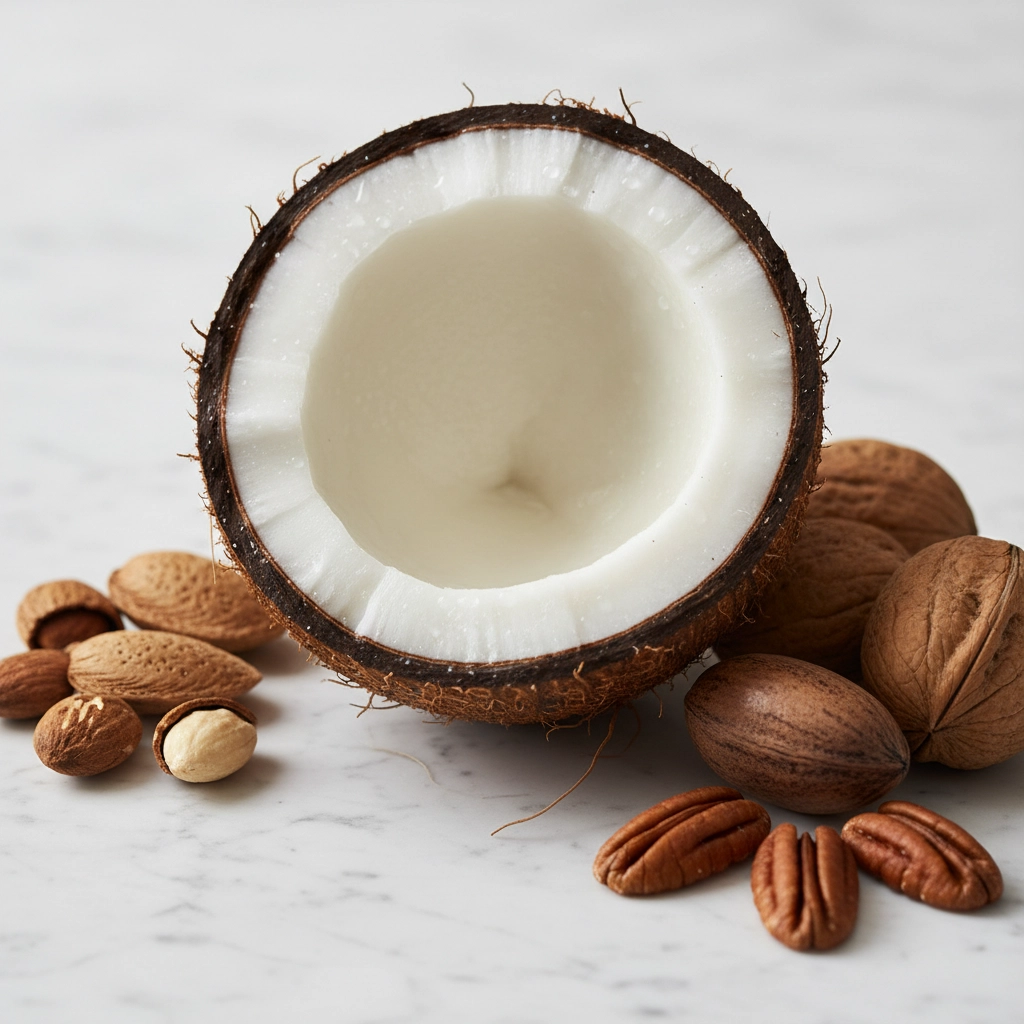For years, parents have stood in grocery store aisles, squinting at food labels and wondering: Is my child with a tree nut allergy safe to eat this coconut product? If you've been one of those parents: or if you're someone living with food allergies yourself: the confusion ends here.
In January 2025, the FDA made a groundbreaking decision that finally brings scientific clarity to a question that has puzzled families, manufacturers, and even healthcare providers for decades. The answer might surprise you, and it's going to change everything about how you shop for allergen-free foods.
1️⃣: Coconut Is Officially No Longer a Tree Nut Allergen
The biggest news of 2025 for the food allergy community came when the FDA officially removed coconut from its list of major tree nut allergens. This means that starting this year, you'll no longer see coconut listed in the "Contains: tree nuts" warning statements on food labels.
This isn't just a minor regulatory tweak: it's a complete reversal of decades-old FDA policy that had been causing unnecessary stress for millions of families. For parents whose children have tree nut allergies, this change eliminates the confusion that forced them to avoid perfectly safe coconut products.
The decision affects everything from coconut milk and coconut flour to shredded coconut in your favorite granola bars. Products that were previously off-limits due to confusing labeling are now clearly distinguished from actual tree nut allergens.

2️⃣: Science Finally Won: Coconut Is Actually a Fruit
Here's the truth that should have been obvious all along: coconut isn't a tree nut at all. Botanically speaking, coconut is classified as a fruit: specifically, it's what scientists call a drupe, similar to peaches or cherries.
The FDA's previous classification had ignored this fundamental botanical reality for years, creating a system where families with tree nut allergies were unnecessarily avoiding a fruit that posed no additional risk to them. Industry professionals and advocacy groups, including the American Herbal Products Association, had been fighting to correct this misclassification for over a decade.
Think about it this way: if we started calling apples "tree nuts" tomorrow, would that make them dangerous for people with actual tree nut allergies? Of course not. The same logic applies to coconut. The name doesn't change the biology, and the biology is what determines allergenicity.
This scientific clarity means that families can now make food choices based on actual risk rather than regulatory confusion. For manufacturers, it means they can create coconut-containing products without the burden of tree nut allergen warnings that never made scientific sense.
3️⃣: The FDA Dramatically Streamlined the Tree Nut List
The coconut decision was part of a much larger FDA overhaul that reduced the official tree nut allergen list from 23 different types down to just 12. This streamlining brings much-needed clarity to an area that had become overwhelming for both consumers and manufacturers.
The current tree nuts that require food allergen labeling are:
- Almond
- Black walnut
- Brazil nut
- California walnut
- Cashew
- Filbert/hazelnut
- Heartnut/Japanese walnut
- Macadamia nut/bush nut
- Pecan
- Pine nut/pinon nut
- Pistachio
- English and Persian walnut
Joining coconut on the "no longer required" list are beech nut, butternut, chestnut, chinquapin, cola/kola nut, ginkgo nut, hickory nut, palm nut, pili nut, and shea nut.
This reduction isn't about making foods less safe: it's about making allergen labeling more accurate and scientifically sound. When everything gets labeled as a major allergen, the truly dangerous items get lost in the noise.

4️⃣: Medical Research Shows No Link Between Tree Nut and Coconut Allergies
Perhaps the most important piece of evidence supporting the FDA's decision is the medical research showing no increased risk for coconut allergy among people with tree nut allergies. These are simply separate conditions that happen to affect different people.
While coconut allergies do exist, they're relatively rare and completely unrelated to tree nut allergies. A person with a severe peanut or almond allergy has no greater likelihood of reacting to coconut than someone without any food allergies.
This medical distinction was crucial in the FDA's decision-making process. Regulatory agencies have a responsibility to base their policies on scientific evidence, not on naming conventions that might sound similar but have no basis in human physiology.
For families managing tree nut allergies, this means you can confidently include coconut products in your diet without worrying about cross-reactivity. For the small number of people who do have coconut allergies, this change actually makes their lives easier by ensuring coconut is clearly listed in ingredients without being buried in confusing tree nut warnings.
5️⃣: Coconut Still Appears in Ingredient Lists: Just Not in Tree Nut Warnings
Here's what hasn't changed: coconut must still be clearly listed by name in ingredient lists. This means anyone with a specific coconut allergy can still easily identify and avoid products containing coconut.
What's different is that coconut will no longer appear in the "Contains: tree nuts" statements that appear after ingredient lists. This seemingly small change eliminates a huge source of confusion for families managing tree nut allergies while still protecting people with coconut allergies.
This approach strikes the right balance between safety and clarity. People who need to avoid coconut can still do so easily, while people avoiding tree nuts won't be unnecessarily restricting their diets.
For manufacturers, this change reduces compliance complexity and allows them to market coconut products more clearly to their intended audiences. It's a win-win situation that should have happened years ago.

What This Means for Your Family's Food Safety
The FDA's 2025 decision represents more than just a regulatory update: it's a victory for science-based policy making in food safety. For too long, families dealing with food allergies have had to navigate a system that confused botanical facts with allergen risks.
If you have a child with tree nut allergies, you can now confidently explore coconut products that were previously off-limits due to confusing labeling. Popular items like coconut milk, coconut flour, and coconut-based snacks are now clearly distinguished from actual tree nut products.
This change also highlights the importance of working with certified allergen-free manufacturers who understand these distinctions and can provide reliable, safe products for your family. At Certified Free From, we've been advocating for this kind of scientific clarity in allergen labeling because we know how much confusion and unnecessary restriction it has caused families.
The coconut decision proves that when science and advocacy work together, we can create a food system that's both safer and more accessible for everyone managing food allergies. It's a reminder that progress is possible, even in areas where outdated policies have persisted for decades.
As we move forward, this decision sets an important precedent for how allergen policy should be made: based on medical evidence and botanical reality, not on assumptions or historical precedent that no longer serves families who depend on accurate labeling for their safety.
Your family's food choices just got a little bit easier, and a lot more scientifically sound.



